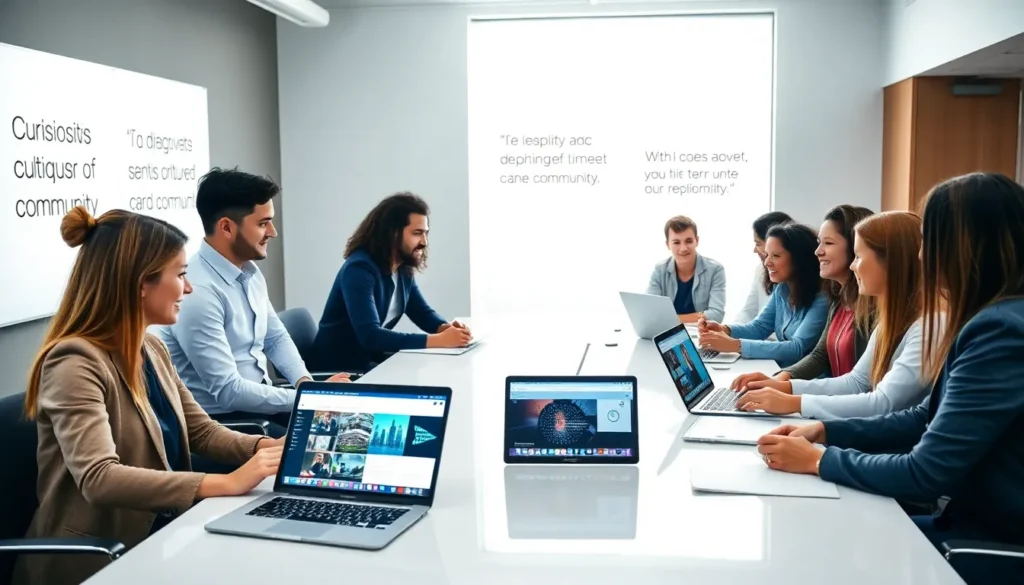In today’s fast-paced world, who has time to sit in a classroom? Enter mobile learning apps—the superheroes of education that fit right in your pocket. With a tap, learners can dive into a universe of knowledge, mastering everything from quantum physics to culinary arts while waiting for their coffee to brew.
These apps turn the mundane into the magnificent, transforming dull study sessions into engaging adventures. Imagine picking up a new language while brushing your teeth or conquering math problems during your daily commute. Mobile learning apps make it possible, proving that education doesn’t have to be confined to four walls. So why not embrace the future of learning and discover how these nifty tools can revolutionize the way we acquire knowledge?
Table of Contents
ToggleOverview Of Mobile Learning Apps
Mobile learning apps revolutionize personal education by providing flexibility and accessibility. They cater to diverse subjects ranging from mathematics to languages, allowing learners to choose topics that suit their interests. These applications often employ interactive elements, making the learning process engaging and efficient.
Many apps offer features such as gamification, where users earn rewards for completing lessons or quizzes. This approach not only enhances motivation but encourages consistent usage. Furthermore, analytics tools within these apps provide insights into progress, helping learners identify strengths and areas for improvement.
Compatibility across devices enhances learning experiences. Users can access lessons on smartphones, tablets, or laptops, ensuring continuity in their educational journey. Offline capabilities also play a crucial role, enabling learners to download content for access without internet connectivity.
Popular mobile learning apps, like Duolingo and Khan Academy, exemplify the diverse offerings available in the market. Duolingo focuses on language acquisition through bite-sized lessons, while Khan Academy delivers comprehensive educational resources across various subjects. Such variance caters to individual learning preferences and styles.
Incorporating social features further enriches the mobile learning experience. Many platforms allow users to connect with peers, participate in discussions, or seek guidance. This sense of community fosters collaboration and enhances the learning process.
As mobile learning apps continue to evolve, the integration of artificial intelligence is becoming commonplace. AI-driven recommendations tailor content to specific learner needs, promoting effective and targeted learning experiences.
Key Features Of Mobile Learning Apps

Mobile learning apps incorporate several key features that enhance the education experience. These aspects make them a preferred choice for many learners.
User Interface and Experience
An intuitive user interface simplifies navigation. Users find it easy to locate lessons and materials. Visual design often emphasizes clarity to avoid distractions. Responsive layout adjusts to various screen sizes, ensuring comfort across devices. Accessibility options cater to learners with disabilities, enhancing overall usability. Frequent updates improve functionality and keep the software current with user needs.
Content Accessibility
Content accessibility stands out as a core feature of mobile learning apps. Offline access lets users download lessons and study without internet connectivity. Diverse formats, such as videos, quizzes, and articles, accommodate different learning preferences. This variety enriches the educational experience and caters to individual learning styles. Users can also customize their learning paths based on interests and proficiency levels. Integration with cloud storage allows for seamless synchronization across devices.
Interactive Elements
Interactive elements foster engagement in mobile learning apps. Gamification techniques encourage users through rewards and friendly competition. Quizzes and simulations enhance understanding by providing practical applications of concepts. Discussion forums promote collaboration and peer support, creating a sense of community among learners. Interactive tutorials and real-time feedback facilitate immediate comprehension of material. These strategies actively involve users, making the learning process more effective and enjoyable.
Benefits Of Mobile Learning Apps
Mobile learning apps offer numerous advantages that significantly enhance the educational experience. These benefits are particularly relevant in today’s fast-paced environment.
Flexibility and Convenience
Flexibility marks a primary benefit of mobile learning apps. Users access their courses anytime, whether waiting for coffee or during commutes. This adaptability allows learners to fit education into their busy schedules. Convenience also emerges through compatibility across various devices, ensuring seamless transitions between smartphones, tablets, and laptops. Additionally, offline capabilities enable users to download materials for learning without an internet connection. Course selections span diverse subjects, catering to individual interests. Learners gain the freedom to explore topics at their own pace, fostering a more personalized educational journey.
Enhanced Engagement
Enhanced engagement characterizes another significant advantage. Many apps incorporate interactive elements like gamification, quizzes, and discussion forums, making lessons more enjoyable. These features stimulate users and encourage participation, which promotes retention of knowledge. Analytics tools track progress, allowing learners to visualize their improvement and stay motivated. Personalized feedback reinforces the learning experience, addressing individual strengths and weaknesses. Community features link users, facilitating collaboration and peer learning. As users interact within the app, they build networks that enhance motivation through shared goals. Increased engagement ultimately leads to more effective education and stronger connections among learners.
Popular Mobile Learning Apps
Mobile learning apps offer diverse options for learners seeking flexibility. These apps continually engage users by providing innovative tools and resources.
App Reviews and Ratings
Popular learning apps often receive positive reviews from users. For instance, Duolingo maintains a rating of 4.8/5 on the App Store, praised for its fun and interactive language lessons. Khan Academy attracts millions with its wealth of free courses, earning high ratings across various platforms. Users appreciate the ease of navigation and content quality in these apps. Additionally, Coursera garners recognition for its partnerships with top universities, which enhance credibility. Ratings reflect user satisfaction and highlight strengths in app functionalities.
Unique Selling Points
Each mobile learning app brings unique features that appeal to different learners. Duolingo employs gamification strategies, motivating users through rewards and competitions. Khan Academy stands out due to its comprehensive library, covering subjects from math to science. Personalized learning paths offered by platforms like Coursera adapt to individual progress and goals. Offline accessibility enables users to download content and learn without an internet connection. Social features in many apps strengthen user communities, fostering interaction and collaboration. These distinct selling points help users choose apps that match their learning preferences and objectives.
Future Trends In Mobile Learning Apps
Artificial intelligence integration shapes the future of mobile learning apps. Personalized content recommendations provide users with tailored learning experiences, enhancing engagement. Real-time feedback from AI algorithms identifies strengths and weaknesses, streamlining educational pathways.
Augmented reality also plays a crucial role in developing interactive learning environments. Experiences that blend digital content with the physical world expand user engagement, making complex subjects easier to grasp. Through immersive scenarios, learners gain practical knowledge, transitioning from theory to application.
The rise of microlearning continues to influence educational trends. Short, focused lessons cater to users who prefer quick bursts of information, aligning with busy lifestyles. Studies show that delivering content in smaller segments boosts knowledge retention significantly.
Collaboration features are on the rise across mobile learning apps. Users can engage in discussion forums, group projects, and peer assessments that foster a sense of community. These interactive components make learning a shared experience, encouraging input and feedback.
Gamification remains integral to sustaining learners’ interest. Competitive elements, such as leaderboards and achievement badges, motivate users to progress through courses. Keeping users engaged enhances overall participation and knowledge acquisition.
Accessibility improvements ensure that all learners can benefit from mobile education. Developers are prioritizing features that accommodate diverse needs, including screen readers and adjustable font sizes. These enhancements create an inclusive learning environment for everyone.
Mobile learning apps will increasingly incorporate blockchain technology for credential verification. Secure, transparent systems simplify the process of earning and sharing educational credentials. Users can showcase their achievements directly, boosting employability and credibility in the job market.
Mobile learning apps are reshaping how education is accessed and experienced. They provide flexibility and engagement that traditional methods often lack. With their ability to turn idle moments into productive learning opportunities, these apps cater to a wide range of interests and learning styles.
As technology continues to advance, the integration of features like artificial intelligence and augmented reality will further enhance the learning experience. The focus on community and collaboration among users promotes a sense of belonging, making education not just a solitary endeavor but a shared journey.
The future of learning is undoubtedly mobile, and as these apps evolve, they’ll continue to empower learners to achieve their educational goals anytime and anywhere.









